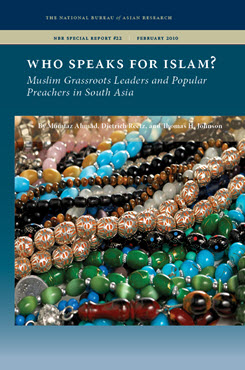Media-Based Preachers and the Creation of New Muslim Publics in Pakistan
This essay examines four emerging popular Muslim religious leaders in Pakistan, their use of new media, and their impact on traditional religious authority.
EXECUTIVE SUMMARY
This essay examines four emerging popular Muslim religious leaders in Pakistan, their use of new media, and their impact on traditional religious authority.
MAIN FINDINGS
- Pakistan’s emerging religious authorities use their familiarity with modern disciplines, in addition to their knowledge of traditional sources of Islamic scholarship, to reach a wider audience and to distinguish themselves from the traditionally educated ulema.
- The so-called media revolution in Pakistan has enabled nontraditional Islamic religious leaders to reach audiences throughout Pakistan and abroad, especially in the major urban centers.
- Though Pakistan’s emerging religious leaders are non-political in their television broadcasts, they are trying to create a Muslim public of their own and to influence Pakistani Muslims’ perspective on Islam.
- Nontraditional Islamic religious leaders have been quite successful in establishing a considerable following among the Pakistani communities abroad, especially in Europe and North America, due to the transmission of broadcasts through satellite and cable channels and frequent visits abroad.
POLICY IMPLICATIONS
- As the Pakistani government and other powerful social institutions have formally renounced jihad as a principal instrument of foreign policy, nontraditional Islamic religious leaders have been tolerated, and also in many ways promoted, by the state.
- In some instances, the emergence of new Islamic religious authorities and the use of new electronic media have allowed Pakistanis to engage in free and uninhibited debate on sensitive religious and socio-political issues.
- Pakistan’s new popular Islamic religious leaders have been able to spread their influence to groups previously alienated by more traditional religious authorities, particularly the middle classes and educated women.


